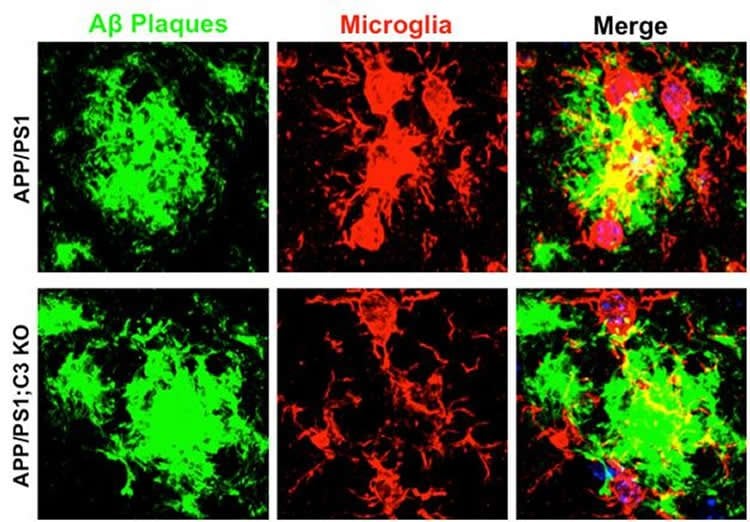Summary: Study offers insight into the link between the immune system and the development of Alzheimer’s disease.
Source: Brigham and Women’s Hospital.
Inhibition of immune molecule complement C3 signaling could offer a new therapeutic strategy for protecting against neurodegeneration.
Just as trimming back the branches of an overgrown plant can encourage healthy growth, a little pruning of the connections in the human brain can be a good thing during brain development. But what happens when this natural process goes wrong later in life? Investigators at Brigham and Women’s Hospital have found new clues from preclinical models to indicate that this “synaptic refinement” may play a role in neurodegenerative disease. Their findings, published in Science Translational Medicine, offer new insights into the interplay between the immune system and the development of Alzheimer’s disease.
The new study looks at the role of complement C3 – a molecule involved in the immune response that is elevated in Alzheimer’s disease. Previous studies have shown that C3 helps to trim back the connections between brain cells – known as synapses – during normal brain development. Synapse loss occurs early in Alzheimer’s disease and is associated with cognitive decline. Researchers have not known whether blocking the “complement cascade” – of which C3 is a central part – could protect against impairment and neurodegeneration at later stages of the disease. In the new study, the team examined the effects of C3 deficiency in a mouse model for Alzheimer’s disease. The team found that mice with the engineered C3 deficiency were protected against age-related loss of synapses and brain cells and had fewer markers of inflammation in the brain.
Interestingly, they also find that in aged mice, the telltale amyloid plaques of Alzheimer’s disease remain – and are even more abundant – but cognitive function improved: mice performed better on a learning and memory task, despite the accumulation of plaque in the brain.

“Amyloid plaque deposition occurs years before memory loss in Alzheimer’s disease, but targeting how the immune system responds to these plaques could be an excellent therapeutic approach,” said corresponding author Cynthia Lemere, PhD, of the Ann Romney Center for Neurologic Diseases at BWH. “We think that in later stages of the disease, it’s not necessarily the plaques but the immune system’s response to them that leads to neurodegeneration.”
C3 has also been implicated in other central nervous system conditions, including stroke and macular degeneration. Although the current study is limited by the differences in the immune system and life span of mice and humans, the team’s findings – and clues from previous studies – suggest that modulating complement signaling may represent a potential therapeutic strategy for combating Alzheimer’s disease.
Funding: This work was funded by Fidelity Biosciences Research Initiative (F-PRIME), NIH/National Institute on Aging (R21 AG044713), BrightFocus Foundation Fellowship, and Edward R. and Anne G. Lefler Fellowship.
Source: Haley Bridger – Brigham and Women’s Hospital
Image Source: NeuroscienceNews.com image is credited to Lemere Lab, Brigham and Women’s Hospital.
Original Research: Abstract for “Complement C3 deficiency protects against neurodegeneration in aged plaque-rich APP/PS1 mice” by Qiaoqiao Shi, Saba Chowdhury, Rong Ma, Kevin X. Le, Soyon Hong, Barbara J. Caldarone, Beth Stevens and Cynthia A. Lemere in Science Translational Medicine. Published online May 31 2017 doi:10.1126/scitranslmed.aaf6295
[cbtabs][cbtab title=”MLA”]Brigham and Women’s Hospital “New Connections Sprout Between Alzheimer’s and the Immune System.” NeuroscienceNews. NeuroscienceNews, 31 May 2017.
<https://neurosciencenews.com/alzheimers-immune-system6807/>.[/cbtab][cbtab title=”APA”]Brigham and Women’s Hospital (2017, May 31). New Connections Sprout Between Alzheimer’s and the Immune System. NeuroscienceNew. Retrieved May 31, 2017 from https://neurosciencenews.com/alzheimers-immune-system6807/[/cbtab][cbtab title=”Chicago”]Brigham and Women’s Hospital “New Connections Sprout Between Alzheimer’s and the Immune System.” https://neurosciencenews.com/alzheimers-immune-system6807/ (accessed May 31, 2017).[/cbtab][/cbtabs]
Abstract
Complement C3 deficiency protects against neurodegeneration in aged plaque-rich APP/PS1 mice
The complement cascade not only is an innate immune response that enables removal of pathogens but also plays an important role in microglia-mediated synaptic refinement during brain development. Complement C3 is elevated in Alzheimer’s disease (AD), colocalizing with neuritic plaques, and appears to contribute to clearance of Aβ by microglia in the brain. Previously, we reported that C3-deficient C57BL/6 mice were protected against age-related and region-specific loss of hippocampal synapses and cognitive decline during normal aging. Furthermore, blocking complement and downstream iC3b/CR3 signaling rescued synapses from Aβ-induced loss in young AD mice before amyloid plaques had accumulated. We assessed the effects of C3 deficiency in aged, plaque-rich APPswe/PS1dE9 transgenic mice (APP/PS1;C3 KO). We examined the effects of C3 deficiency on cognition, Aβ plaque deposition, and plaque-related neuropathology at later AD stages in these mice. We found that 16-month-old APP/PS1;C3 KO mice performed better on a learning and memory task than did APP/PS1 mice, despite having more cerebral Aβ plaques. Aged APP/PS1;C3 KO mice also had fewer microglia and astrocytes localized within the center of hippocampal Aβ plaques compared to APP/PS1 mice. Several proinflammatory cytokines in the brain were reduced in APP/PS1;C3 KO mice, consistent with an altered microglial phenotype. C3 deficiency also protected APP/PS1 mice against age-dependent loss of synapses and neurons. Our study suggests that complement C3 or downstream complement activation fragments may play an important role in Aβ plaque pathology, glial responses to plaques, and neuronal dysfunction in the brains of APP/PS1 mice.
“Complement C3 deficiency protects against neurodegeneration in aged plaque-rich APP/PS1 mice” by Qiaoqiao Shi, Saba Chowdhury, Rong Ma, Kevin X. Le, Soyon Hong, Barbara J. Caldarone, Beth Stevens and Cynthia A. Lemere in Science Translational Medicine. Published online May 31 2017 doi:10.1126/scitranslmed.aaf6295






